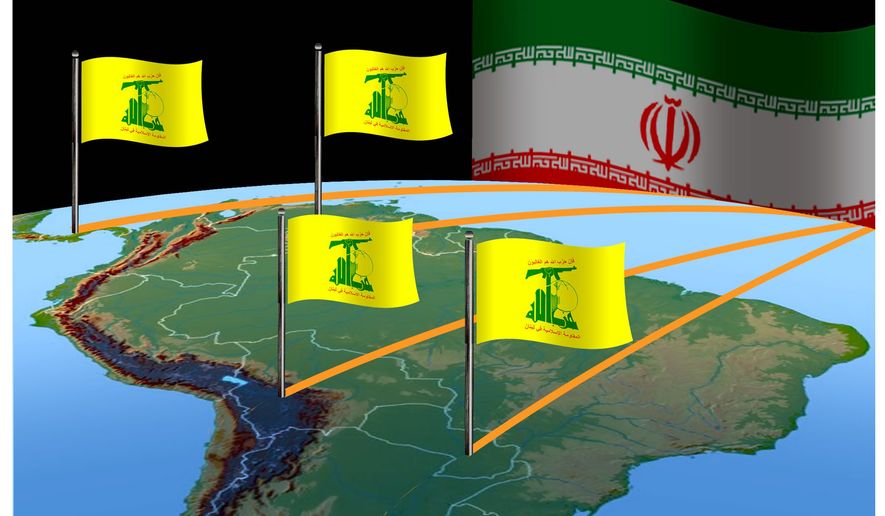OPINION:
Even a cursory look at Attorney General Jeff Sessions’ bio shows a man who built a career around fighting crime, drugs and terror.
Today he’s poised to “hit the jackpot” against all three by going after Hezbollah in Latin America. In his statement this month announcing the creation of the Justice Department’s Hezbollah Financing and Narcoterrorism Team, Mr. Sessions said they “will leave no stone unturned to eliminate threats to our citizens from terrorist organizations and to stem the tide of the devastating drug crisis.”
Several of those stones are in Latin America.
Hezbollah, Iran’s chief global terror proxy, has grown richer and more powerful there for decades. That’s especially true in Venezuela, but also Bolivia, Paraguay, Panama and several other countries throughout the region. The Lebanese-based crime-terror network uses its vast expatriate community to traffic in drugs like cocaine, while money laundering in black market used car sales to Africa and cigarette smuggling.
Venezuela’s Vice President Tareck El-Aissami, an ethnic Syrian-Lebanese 43-year old with deep ties to the expatriate community, was sanctioned by the U.S. Treasury Department last February as a “Specially Designated Narcotics Trafficker.” He’s been accused of creating a crime-terror pipeline that sends illicit funds and drugs from Latin America to the Middle East and funnels back foreign fighters.
With friends in high places like Venezuela’s vice president, Lebanese Hezbollah has reaped an estimated $1 billion enterprise in Latin America using the Hawala system of money couriers — financing terrorism in places like Syria and beyond. Ever wonder where Hezbollah gets the money to buy missiles for attacking Israel? Look to Latin America.
It’s a crisis that’s been building for years.
In 2008, the U.S. Drug Enforcement Agency created “Project Cassandra” to target Hezbollah globally. As recently as February 2016, DEA issued a press release titled, “DEA and European Authorities Uncover Massive Hezbollah Drug and Money Laundering Scheme: 7 countries involved in disrupting drug money flow for terror regime.”
But then according to some ex-Obama officials, the U.S. backed off because Team Obama gave priority to fostering Iran’s nuclear deal.
Katherine Bauer, a former U.S. Treasury official testified before the House Foreign Affairs Committee last February that the investigations against Hezbollah during the Obama White House, “were tamped down for fear of rocking the boat with Iran and jeopardizing the nuclear deal.”
It was a bargain that the U.S. lost in every possible way.
In exchange for enabling the Iran deal which merely slows, not stops, Iran’s pursuit of nuclear weapons, it soft-peddled Hezbollah’s role in selling drugs and raising money for more terrorism. Lest we forget, Iran’s nuclear program is not its only threat. Since the 1979 Revolution, the regime’s goal is to “spread revolutionary Islam” targeting those seen as impeding their progress — like the U.S., Israel and rival Sunni Muslim powers Saudi Arabia and Gulf States.
Hezbollah, aka Party of God, is a Shiite political party which shares Iran’s vision. It was designated by the U.S. as a terrorist organization over 20 years ago, and has pulled off terror attacks both inside and outside the Middle East. Iran isn’t shy about targeting its enemies, regardless of location.
Notably, the deadliest Islamist terror attacks in the Western Hemisphere were bombings against the AMIA Cultural Center and Israeli Embassy both in Buenos Aires, Argentina during the early 1990s. According to Argentine investigators, it was allegedly payback for Argentine President Carlos Menem’s behind the scenes maneuvering to stop Argentina from sharing nuclear technology with the Ayatollah’s men. Argentina’s chief prosecutor, Alberto Nisman, was assassinated in 2015 just days after releasing his damning report about Argentina’s role in covering up Iranian implication in the attacks.
According to a 2016 report titled “After Nisman” by the Center for a Secure Free Society (SFS), Iran initiated a dual-track diplomatic strategy during President Obama’s tenure to whitewash its role in the Argentina attacks while paving the way for the United Nation’s P5+1 nuclear deal. The report also suggests Mr. Nisman was killed because he escalated his efforts during the height of Iran’s nuclear negotiations.
And just last month, former President Cristina Fernandez de Kirchner was charged with treason by an Argentine judge over this scandal
In other words, Iran’s terror streak is long, deep and complex in Latin America. Inextricably tied to its terror proxy and their trans-national criminal enterprise. It’s time to crack down on Iran and Hezbollah to stop them in their tracks.
With the right level of oversight, collaboration with allies and congressional support, Mr. Sessions will hit the jackpot against the trifecta of crime, drugs and terror.
• J.D. Gordon is a retired Navy commander and former Pentagon spokesman who served as an adviser to three Republican presidential candidates including Donald Trump.




Please read our comment policy before commenting.